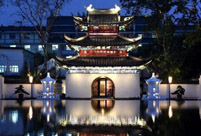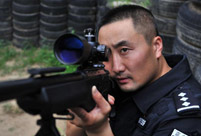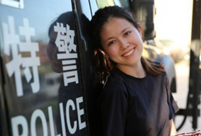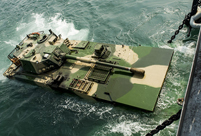 YOG kicks off in Nanjing
YOG kicks off in Nanjing
 Colorful life at Youth Olympic Village of Nanjing 2014 YOG
Colorful life at Youth Olympic Village of Nanjing 2014 YOG
 Royal Taoist temple to open to public
Royal Taoist temple to open to public
 Female soldiers at quake-hit area
Female soldiers at quake-hit area
 Shocking photos of cruel battles in Ukraine
Shocking photos of cruel battles in Ukraine
 Amphibious armored vehicle unit conducts open sea drill
Amphibious armored vehicle unit conducts open sea drill
 Water relay in Henan
Water relay in Henan
 Ethnic culture feasts eyes of travelers
Ethnic culture feasts eyes of travelers
 80 security dogs assembled in Nanjing police dog training base
80 security dogs assembled in Nanjing police dog training base
 Graffiti artists paint on street walls in Xinjiang
Graffiti artists paint on street walls in Xinjiang
The best strategy needs tactics
Since ancient times, a weak nation's diplomacy has been reactive rather than proactive. Culture and the military are normally regarded as the soft power and hard power with which a nation engages with the world.
During more than 30 years of peace and rapid development, corruption has accrued within the People's Liberation Army. The investigations into Gu Junshan, the former deputy head of the logistics department of the PLA, and Xu Caihou, the former vice-chairman of the Central Military Commission, which made public earlier this year, are considered part of a determined strategy conducted by President Xi Jinping to improve the quality and spirit of the military.
Remolding the spirit of the PLA should come before the rebuilding of its soul, and anti-corruption is seen as the only way to achieve this goal.
"It will generate a fatal influence on national security if the development of the military lags behind. Words depicting how China's ill-developed military were attacked always sent me into deep grief when I read history books" said President Xi Jinping, during a meeting on December 27, 2013. That day was also the first day after commemorating the 120th anniversary of Mao Zedong's birthday.
The name of the meeting, though known to insiders as an important one, has not been disclosed to public.
This quote is also listed in the newly published book titled Excerpts of Xi Jinping's Remarks on Comprehensive and Deep Reforms.
Military reform is going hand-in-hand with a campaign against military corruption. Military reform was also written into the reform package of the Third Plenary Session of the 18th CPC Central Committee, or the Third Plenum, which laid out plans to improve the defense industry, weaponry development, personnel training and military officers' benefits.
China's official media have repeatedly stressed that President Xi Jinping has personally drawn up and is directing this round of national defense and army reform.
Xi's remarks at the unnamed meeting mentioned above fully express his strategy of building a modern military, said an analysis posted by an overseas edition of People's Daily on its official WeChat, a popular instant messaging and phone mobile app in China.
A military drill was staged in late July amid various anniversaries - the 20th anniversary of the First Sino-Japanese War (1894-95), the 100th anniversary of the First World War, and the founding of the PLA. The drill stood out from its predecessors as the PLA showed what it had got, making explicit its determination to win.
China plans to establish a collaborative command center in the East China Sea that will integrate its army, navy and air forces in the area, according to media reports. The move is believed to aimed at improving tactical capability.
The highest form of generalship is to balk (counter) the enemy's plans, said Sun Tzu, an ancient Chinese military strategist. What the PLA is doing now is also using psychology to "balk the enemy's plans" . Xi promoted the idea of national rejuvenation soon after taking office. He also declared to the world it was the awakening of a sleeping lion, a term used by Napoleon Bonaparte to describe China as a weak nation with potential power. These remarks have sent the message that China is an active player in the global arena, a rising power which increasingly adopts its own stance in its exchanges with the US and which is no longer shy of showing its military capabilities.
 |  |
 Beautiful night scenery of Nanjing
Beautiful night scenery of Nanjing Passenger transport starts on Tibet's new railway
Passenger transport starts on Tibet's new railway Story of outstanding Beijing swat sniper
Story of outstanding Beijing swat sniper Beautiful policewoman in an anti-terrorism SWAT team
Beautiful policewoman in an anti-terrorism SWAT team Cute photos of little Taoist nuns and monks go viral online
Cute photos of little Taoist nuns and monks go viral online Amphibious armored vehicle unit conducts open sea drill
Amphibious armored vehicle unit conducts open sea drill A post-90s girl who takes grandma to work
A post-90s girl who takes grandma to work Beijing policewomen posters become a hit
Beijing policewomen posters become a hit The vanishing folk skills
The vanishing folk skills Intoxicating beauty of Dali, Yunnan province
Intoxicating beauty of Dali, Yunnan province Memorable moments of Ludian earthquake
Memorable moments of Ludian earthquake Bring world together to help elephant
Bring world together to help elephant 'Building Dreams'
'Building Dreams'  Labrang Monastery
Labrang MonasteryDay|Week|Month